 January 2021
January 2021
Condo budgets are under pressure on multiple fronts. Communities can choose to accept these higher costs, and increased condo fees, or adapt.
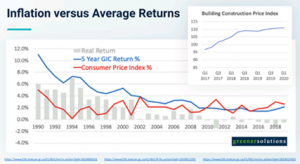 Reserve funds understate cost increases. Reserve funds typically use the consumer rate of inflation which is about two percent. The building construction rate of inflation, which is more indicative of condo community cost increases, has ranged from five percent to 10 percent and sometimes higher.
Reserve funds understate cost increases. Reserve funds typically use the consumer rate of inflation which is about two percent. The building construction rate of inflation, which is more indicative of condo community cost increases, has ranged from five percent to 10 percent and sometimes higher.
 Insurance costs are on the rise. Buildings are now more likely to be insured by multiple companies to spread risk. Annual premiums and deductibles have increased.
Insurance costs are on the rise. Buildings are now more likely to be insured by multiple companies to spread risk. Annual premiums and deductibles have increased.
There will likely be another couple of years of increasing insurance premiums before rates stabilize.
The minimum wage has increased impacting on most employee salaries.
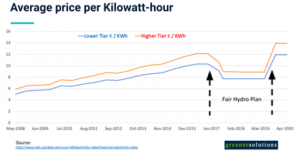
Utility costs have increased because of COVID. With more people at home throughout the day utility use has increased and use patterns have changed. A review of select building data shows how costs have increased:
- Boilers are running much more throughout the day.
- Gas costs increased an estimated 16 percent through March, April and May of 2020 or about $1,200 per month. This unbudgeted expense will have to be repaid through higher condo fees.
- Electricity costs have increased. Fan speeds are up an estimated 29 percent and energy use is up an estimated 115 percent or $829 per month.
- Water use is up an estimated 11 to 20 percent. Over two months this is an additional $5,300 in expenses.
Ability to pay higher condo fees has become more difficult because of COVID. Incomes are reduced or eliminated because of COVID temporary or permanent closures and job loss.
One way to address condo budget challenges is to have a better understanding of controllable building costs and seek permanent ways to reduce them. Focus should be reducing the largest budget items; utility costs can account for up to 60 percent of a condo budget. Consider improving building systems so fewer utilities are used. Until recently, improvements in building systems were in a holding pattern with few effective innovations. Preventative maintenance helps but is an incomplete solution.
Building Intelligence – Know your building
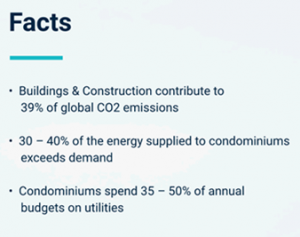 With knowledge comes the ability to react and improve.
With knowledge comes the ability to react and improve.
Without knowing where and how utilities are used, reducing utility use is difficult.
Submetering systems are effective in that they track and report energy used in each unit. Heavier energy users pay more than those who conserve. Overall costs drop for most with savings achieved by residents modifying their behaviour rather than paying more. Yet this only scratches the surface in terms of energy efficiency and cost savings in high-rise communities because of the complex interaction among building systems. Most rarely consider the impact of turning on a light switch, showering, cooking, cooling or heating on building equipment and costs. When hundreds of people expand home activities, building systems are unlikely to perform as expected.
Water sensors monitor and report on moisture where it should not be. The sooner moisture is detected and addressed, the less damage that occurs. Repair and insurance costs are reduced. Fewer resident complaints and problems occur resulting in financial and time savings.
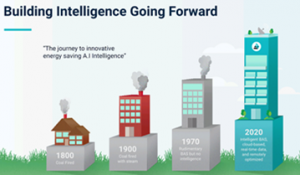 Building automation systems can control an internal environment to balance comfort, energy efficiency and cost more effectively than manually adjusting individual equipment settings. Added benefits include improved air quality and a healthier living environment.
Building automation systems can control an internal environment to balance comfort, energy efficiency and cost more effectively than manually adjusting individual equipment settings. Added benefits include improved air quality and a healthier living environment.
Today there are additional ways to reduce the use of utilities, and optimize equipment performance, which account for up to 60 percent of annual building costs. Small improvements can yield dramatic savings.
When considering long-term approaches to cost control:
- Condo budgets must continue to support virtually certain continued cost increases and loss of owner ability to pay higher fees.
- Reserve fund monies invested in GICs lose value each year. Returns are under two percent. Inflation of costs is dramatically higher.
- The best investment a community can make is to reduce costs. Some communities embrace suite metering systems to reduce resident use of electricity. Sensors provide greater awareness of what is happening in unseen areas. Building automation systems handle many system adjustments.
- Expanding budgets to better manage efficiency is more effective than implementing isolated changes.
- Look at running existing equipment better rather than replacing equipment.
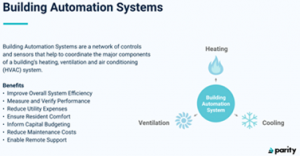
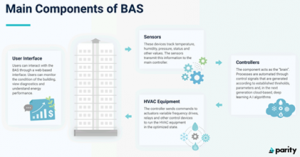
Acting on Building Intelligence
Artificial intelligence provides real-time awareness and immediate resolution of problems without manual intervention. It is a software “brain” that uses data from software, controllers and sensors to find better ways of running existing systems. Automated system adjustments occur before residents or management become aware of problems.
Consider what happens when some owners complain that heating is not working properly. Someone contacts management. The problem gets confirmed then a call is made for service. A truck will get dispatched and someone arrives to determine the problem and resolve it. The entire process can take days.
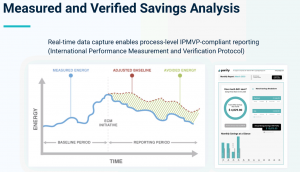 Artificial intelligence is like steroids for building automation systems. Previously impossible feats become simple. It allows your building to automatically detect the system problem and lack of heat in some areas. Parts of the system might automatically be adjusted to provide heating to an affected area without impact on the rest of the building. If a part has failed a regular service call could be automatically scheduled. Residents are unaware a problem exists. The cost of a service call, emergency maintenance, and management time is all avoided.
Artificial intelligence is like steroids for building automation systems. Previously impossible feats become simple. It allows your building to automatically detect the system problem and lack of heat in some areas. Parts of the system might automatically be adjusted to provide heating to an affected area without impact on the rest of the building. If a part has failed a regular service call could be automatically scheduled. Residents are unaware a problem exists. The cost of a service call, emergency maintenance, and management time is all avoided.
This is achieved by incorporating a series of sensors and controllers throughout a building and its major systems. A system “brain” monitors for deviations or anomalies and automatically adjusts to compensate. A visual display and reporting system delivers information on building status, system failures and adjustments. The value of a building automation system incorporating artificial intelligence is clear when viewing system reports and actual savings.
Toronto Condo News thanks Parity Inc. for their assistance with this article and permission to use charts from their June 25, 2020 presentation Real-Time Energy Management and Data Insights into COVID-19 Budget Impacts. Contact Parity at www.paritygo.com to learn how your community can benefit from its artificial intelligence technology.
Find Vendors in these Related Categories
- Accounting
- Air Quality
- Building Sciences
- Energy Services
- Energy Services - Efficiency
- Energy Services - Electricity
- Energy Services - Gas
- Energy Services - Water
- Engineering Services
- Environmental Consulting
- Financial Services
- Financial Services - Investments
- Financial Services - Loans
- Financial Services - Mortgages
- Home Services & Automation
- HVAC
- Lighting Services & Suppliers







